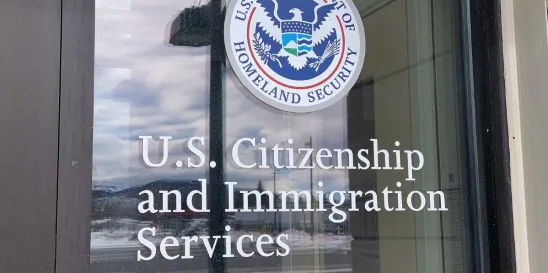On December 27, the U.S. Citizenship and Immigration Services (USCIS) announced a final rule to increase premium processing fees, effective Feb. 26, 2024. Accordingly, all requests for premium processing postmarked on or after Feb. 26 must include the new fee.
The USCIS attributes the fee increase to inflation identified by the Consumer Price Index for All Urban Consumers (CPI-U) between June 2021 and June 2023 in accordance with its authority under the Emergency Stopgap USCIS Stabilization Act.
Once in effect, the premium processing fees will shift in accordance with the following table published by the USCIS:
| Form | Current Fee | New Fee |
|---|---|---|
| Form I-129, Petition for a Nonimmigrant Worker |
$1,500 (H-2B or R-1 nonimmigrant status) $2,500 (All other available Form I-129 classifications (E-1, E-2, E-3, H-1B, H-3, L-1A, L-1B, LZ, O-1, O-2, P-1, P-1S, P-2, P-2S, P-3, P-3S, Q-1, TN-1, and TN-2)) |
$1,685 (H-2B or R-1 nonimmigrant status) $2,805 (All other available Form I-129 classifications (E-1, E-2, E-3, H-1B, H-3, L-1A, L-1B, LZ, O-1, O-2, P-1, P-1S, P-2, P-2S, P-3, P-3S, Q-1, TN-1, and TN-2)) |
| Form I-140, Immigrant Petition for Alien Worker | $2,500 (Employment-based (EB) classificationsE11, E12, E21 (non-NIW), E31, E32, EW3, E13 and E21 (NIW)) | $2,805 (Employment-based (EB) classificationsE11, E12, E21 (non-NIW), E31, E32, EW3, E13 and E21 (NIW)) |
| Form I-539, Application to Extend/Change Nonimmigrant Status | $1,750 (Form I-539 classifications F-1, F-2, M-1, M-2, J-1, J-2, E-1, E-2, E-3, L-2, H-4, O-3, P-4, and R-2) | $1,965 (Form I-539 classifications F-1, F-2, M-1, M-2, J-1, J-2, E-1, E-2, E-3, L-2, H-4, O-3, P-4, and R-2) |
| Form I-765, Application for Employment Authorization | $1,500 (Certain F-1 students with categories C03A, C03B, C03C) | $1,685 (Certain F-1 students with categories C03A, C03B, C03C) |
The last notable increase to premium processing fees occurred in 2020 when the Continuing Appropriations Act, which included the Emergency Stopgap USCIS Stabilization Act (USCIS Stabilization Act), set new fees for premium processing of immigration benefit requests.
The USCIS Stabilization Act also expanded the authority of the U.S. Department of Homeland Security (DHS) to establish and collect new premium processing fees, including the authorized adjustment on a biennial basis. Despite such authority, the DHS had not adjusted the fees since October 2020.
The increase may feel like highway robbery to many individuals and employers. Regardless, many will continue to use the premium processing service, as it provides greater control over the timing of nonimmigrant and immigrant visa petitions.
The USCIS is anticipated to continue expanding the availability of premium processing to a wider variety of cases in accordance with the authority it was granted by the USCIS Stabilization Act.
This article was co-authored by Tieranny Cutler, independent contract attorney.




 />i
/>i

